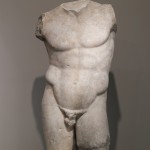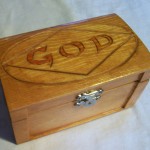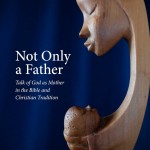[This is a work in progress. Your comments are welcome.]
Preface
1. In the end, the sons forgot their mothers, the teachers forsook Wisdom for the law, the priests left off the sacrifice to the Goddess, the people reviled the night and the Moon and the sea, and looked only to the day sky for gods, and the names of the Goddess were forgotten.
2. In that day, the waters of Tehom, the Abyss, rose up and covered the earth.
3. All mankind, and all the crawling things on the face of the earth, were drowned.
4. The flood swallowed the sun, and the Moon, and all the gods.
Chapter 1
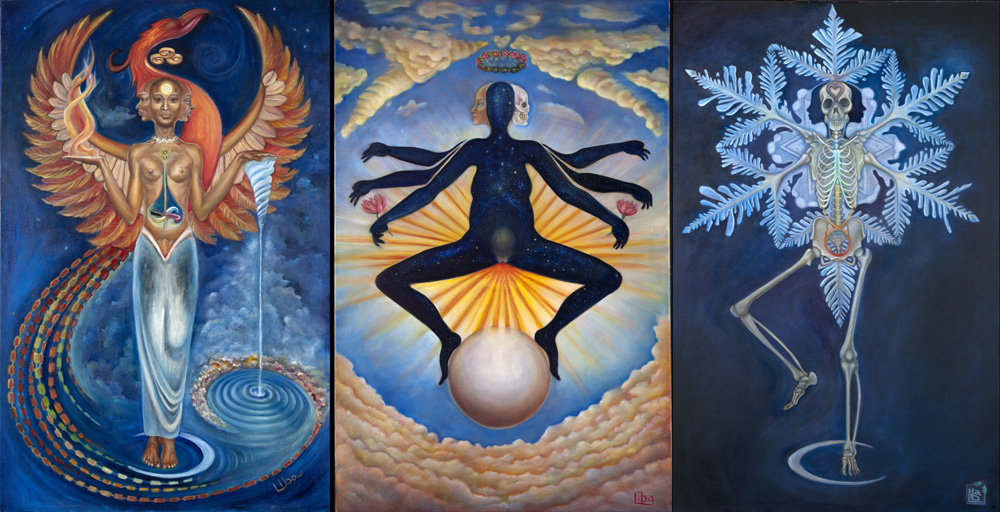
1. In the beginning, before the Goddess (Elat) gave birth to the Earth, before the gods were born, Earth was not, nor the Heavens above.
2. There was only Tehom, who is called the Abyss and the Deep, the Womb (Rechem) of the Goddess, She who bore them all, She who is called Tiamat by the Chaldeans and Nunet by the Egyptians.
3. The Goddess was without form, but she was not void.
4. For the Earth, the daughter of the Goddess, whom the Chaldeans call Ninhursag, filled the Watery Womb of the Goddess.
5. The Goddess stretched her Body, and the Flood receded, revealing the firmament of the Night Sky, the star-lined womb of the Goddess, whom the Egyptians call Nut.
6. The waters of the Deep receded farther, and the Earth was born.
7. The breath (ruach) of the Goddess moved over the face of the Deep and over the face of the Night Sky and over the face of the Earth.
8. The stars, who are called the sons and daughters of the Goddess (bene Eloha), sang together and shouted for joy.
9. In that hour, the Moon rose from the Deep and danced across the face of the Night Sky.
10. When she was exhausted, she rested again in the Deep.
11. Ever turning, her face looked toward the Deep and then toward the Sky and then toward the Deep again.
12. When she looked toward the Deep, her face shone bright, and for this reason she is called Our Lady of Sighs.
13. When she turned away, half of her face shone bright and the other half was obscured, and for this reason she is called Our Lady of Tears.
14. And when she looked toward the Sky, her black hair obscured her light, and for this reason she is called Our Lady of Darkness.
15. The drops of her suete fell as dew upon the face of the Earth and the Earth became fertile.
16. A great tree grew on the Earth, which was later called Shaddai, She of the Breasts, for it was a tree of Life and it nurtured all.
17. The top of the Tree reached to the Heavens and four great roots grew from the tree and reached into the waters beneath the Earth.
18. The light of the Moon and the Stars shone on the leaves of the tree and the breath of the Goddess blew through its branches.
19. A spring emerged from beneath the tree. Four rivers went out from the tree, dividing the world: east, south, west, and north.
20. A Serpent (nechesh) was born from the Earth.
21. The Serpent crawled from the earth and girdled the circuit of the great tree and twined lovingly around her limbs.
22. The Serpent climbed up the tree to speak with the Stars and crawled back down again rest in the Earth.
23. There fell from the Tree fruits of every variety, bearing seeds.
24. The seeds were moistened by the dews of the Moon and there sprang up plants of every kind, grasses and wildflowers.
Chapter 2
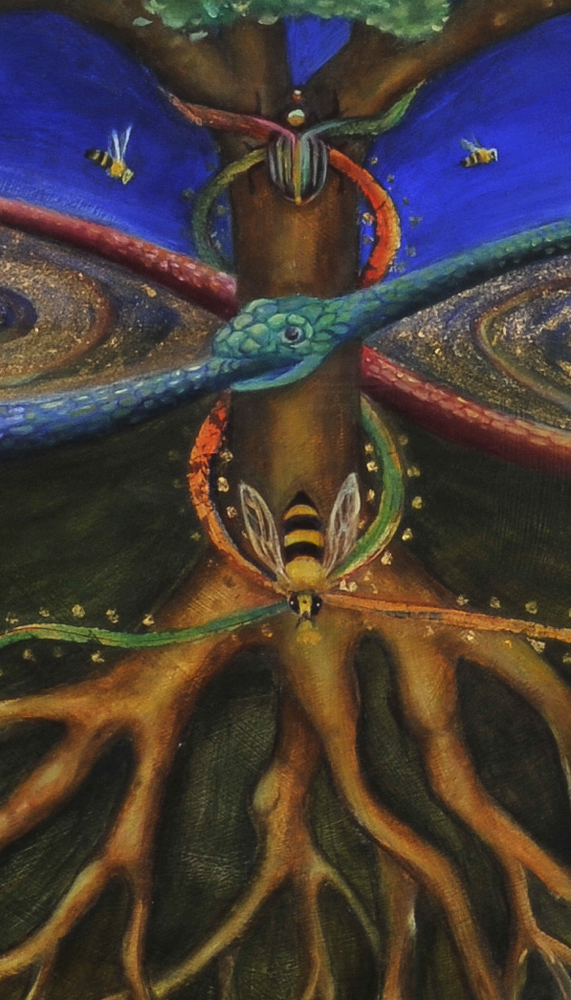
1. And the sons of the Goddess beheld the daughters of the Goddess and lusted after them and the daughters after the sons.
2. One of the sons of the Goddess, the Cloud Rider (Rokeb), beheld the Tree of Life and lusted after her.
3. And he descended in the form of a great cloud and enveloped her.
4. But he grew jealous of the serpent, entwined among her limbs, for she was not discriminating in her love.
5. And he struck her down with lighting like a flaming sword and burned her boughs to ashes.
6. And he sought to strike down the serpent, but the serpent went into the Earth.
7. But the breath of the Goddess blew the ashes of the Tree across the face of the Earth, and other trees sprang up.
8. Then it was that the Moon became red and the dews which fell were red.
9. And the red dew mingled with the seas and the fishes were born.
10. And the red dew mingled with the earth and the beasts and birds, which breathe the breath of the Goddess, were born.
11. And the red dew mingled with the ashes of the Tree of Life, and womankind (Ashe) was born.
12. Of all the beasts, only womankind stood erect like the trees, and looked up to the sky and beheld the Moon.
13. And the Goddess whispered to womankind in the breath of the wind in the trees.
14. And the Serpent came and taught Wisdom (Chokhmah) to womankind.
15. And the wombs of womankind were full.
16. And womankind counted the passings of the Moon.
17. Then another of the sons of the Goddess descended from the Night Sky, the greatest among them, the Sun, known to the Egyptians as Ra.
18. And he lusted after the Moon and chased her, but rarely could he catch her.
19. And when he did, his light was darkened.
20. When the Moon had performed her dance ten times, womankind bore sons.
21. And sons of womankind did not know a time before the Day Sky.
22. And womankind took the sons as lovers. And sons and daughters were born.
Chapter 3
1. Then the Cloud Rider saw the creation which surrounded him, and forgetting the place from which he came, said to himself, “Who hath created this?
2. “I am he (Yahweh). I am the first. My glory I will not share with another. I am the most high God (El Elyon) and there is no other beside me.”
3. In those days, there were thunders and lightnings, and humankind trembled.
4. In that time, the Cloud Rider forbad humankind to listen to voice of the Goddess in the trees, for he was jealous of the trees.
5. And the Cloud Rider came to womankind and offered to teach them the making of fire and the tempering of metals for weapons.
6. But womankind would not listen to the thundering of the Cloud Rider.
7. They heard only the whisperings of the Goddess in the boughs of the trees.
8. And they shunned the Cloud Rider, and he hated womankind ever after.
9. So the Cloud Rider came to mankind, and mankind learned from him the making of fire and metal and the forging of weapons.
10. And there was war on the face of the Earth.
11. And mankind worshiped the Cloud Rider out of fear.
12. But the Cloud Rider came and went like a storm.
13. And when the Could Rider came and went, mankind believed it was because of their sins.
14. But the Goddess was always with womankind.
15. The Goddess was the bones of womankind, and their blood, and their flesh.
15. And these were the words which she spoke:
16: “Before the works of the Lord, I was.
17. From the beginning, I was.
18. Before there were fountains abounding with water, I was.
19. Before the mountains and the hills were established, I was.
20. When the earth was not yet born, I was.
21. When the Heavens and the Seas were divided, I was.
22. Before God was, I am (Ehyeh).”
23. And womankind remembered, and taught their daughters and those of their sons who would listen.
[To be continued …]
Notes
parthenogenesis: “virgin birth”; birth from a female without sexual intercourse with a male
“In the end …”: This is a cyclical story; the end and the beginning are one.
“the teachers forsook Wisdom for the law”: The Deuteronomists subsumed Wisdom (a goddess) under the law (See Deut. 4:6; Margaret Barker, The Great Angel: A Study of Israel’s Second God (1992), pp. 13, 50-51).
“left off the sacrifice to the Goddess”: Jeremiah 44:18 (“since we left off to burn incense to the queen of heaven, and to pour out drink offerings unto her, we have wanted all things”)
“… looked only to the day sky for gods”: See Bruce Lerro, From Earth Spirits to Sky Gods: The Socioecological Origins of Monotheism, Individualism, and Hyperabstract Reasoning from the Stone Age to the Axial Iron Age (2000)
“the names of the Goddess were forgotten”: Jer. 23:27 (“… cause my people to forget my name”)
“Tehom, who is called the Abyss and the Deep …”: the waters of Chaos from Gen. 1:2
“the waters of Tehom, the Abyss, rose up and covered the earth”: an allusion to the Deluge; Gen. 7:11 “were all the fountains of the great deep broken up”
“the Goddess (Elat) gave birth to the Earth”: See Plutarch: “The work of a maker — as of a builder, a weaver, a musical-instrument maker, or a statuary — is altogether distinct and separate from its author; but the principle and power of the procreator is implanted in the progeny, and contains his nature, the progeny being a piece pulled off the procreator. Since therefore the world is neither like a piece of potter’s work nor joiner’s work, but there is a great share of life and divinity in it, which God from [her]self communicated to and mixed with matter, God may properly be called [Mother] of the world — since it has life in it.”
“before the gods were born, Earth was not, nor the Heavens above. There was only Tehom, who is called the Abyss and the Deep …”: from the Babylonian Enuma Elish: “When of the gods none had been called into being, and none bore a name, and no destinies were ordained; and the primeval Apsû, who begat them, and chaos, Tiamat, the mother of them both …”
“The Goddess was without form, but she was not void”: in contrast to creation ex nihlo; the idea of the pregnant abyss is one that has a long history dating back to Jung, Hegel, Schelling, and Jacob Boehme.
“The waters of the Deep receded farther, and the Earth was born”: from the Egyptian creation myth in which the primal mound emerges from the waters of chaos (the Nile).
“The stars, who are called the sons and daughters of the Goddess (bene Eloha), sang together and shouted for joy”: Job 38:7 (“while the morning stars sang together and all the angels shouted for joy”); see also the Homeric Hymn to Delian Apollo (“the pains of birth seized Leto, and she longed to bring forth; so she cast her arms about a palm tree and kneeled on the soft meadow while the earth laughed for joy beneath. Then the child leaped forth to the light, and all the goddesses raised a cry.”)
“The breath (ruach) of the Goddess moved over the face of the Deep …”: Gen. 1:2 (“the Spirit of God was hovering over the face of the waters.”)
“Our Lady of Sighs …”: a unique take on the Triple Goddess; from Thomas De Quincey’s “Levana and Our Ladies of Sorrow”, discussing Levana, the ancient Roman goddess of childbirth and her imagined companions: Mater Lachrymarum, Our Lady of Tears; Mater Suspiriorum, Our Lady of Sighs; and Mater Tenebrarum, Our Lady of Darkness. (Admittedly, this element breaks the pattern of using ancient Near Eastern sources.)
“… as dew upon the face of the Earth …”: Gen. 2:6 (“there went up a mist from the earth, and watered the whole face of the ground”)
“Shaddai, She of the Breasts …”: El Shaddai was an epithet for Yahweh used many times in Job (see also Gen. 49:25 (“bless thee with blessings of heaven above, blessings of the deep that lieth under, blessings of the breasts, and of the womb”)
“the Tree reached to the Heavens. Four great roots grew from the tree and reached into the waters beneath the Earth”: inspired by the Tree of Life in the Garden of Eden, the Norse World Tree Yggdrasil, and the four rivers of Gen. 2:10
“climbed up the tree to speak with the Stars and crawled back down again rest in the Earth”: a kind of “Jacob’s ladder”, Gen. 28:12 (“there was a ladder set up on the earth, and the top of it reached to heaven; and behold, the angels of God were ascending and descending on it”)
“Cloud Rider”: a epithet of Yahweh (and his Canaanite twin, Baal)
“But he grew jealous …”: Ex. 34:14 (“for the LORD, whose name is Jealous, is a jealous God)
“the Moon became red”: Rev. 6:12 (“the moon became as blood”)
“… whispered to womankind in the breath of the wind in the trees”: One method of divination in the Levant may have been to listen to the sound of the wind in the trees.
“I am the first. My glory I will not share with another. I am the most high God …”: from the Gnostic myth of the Demiurge (Yaldabaoth) in the Apocryphon of John
“like a flaming sword …”: Gen. 3:24
“Wisdom …”: Sophia in Greek; honored as a goddess by the Gnostics
“When the Moon had performed her dance ten times …”: The human gestational period is ten 28-day cycles.
“… he was jealous of the trees”: 2 Kings 17:10; 23:14 (“And they set them up images and groves in every high hill, and under every green tree … and he [Josiah] brake in pieces the images, and cut down the groves, and filled their places with the bones of men.)
“…the tempering of metals for weapons”: In the Book of Enoch, the rebel angels taught humankind metalwork and the making of weapons, among other things.
“Before the works of the Lord, I was …“: A reformulation of Proverbs 8:22-31, which describes Wisdom as co-existing with God; inspired by Algernon Swinburne’s “Hertha”.



